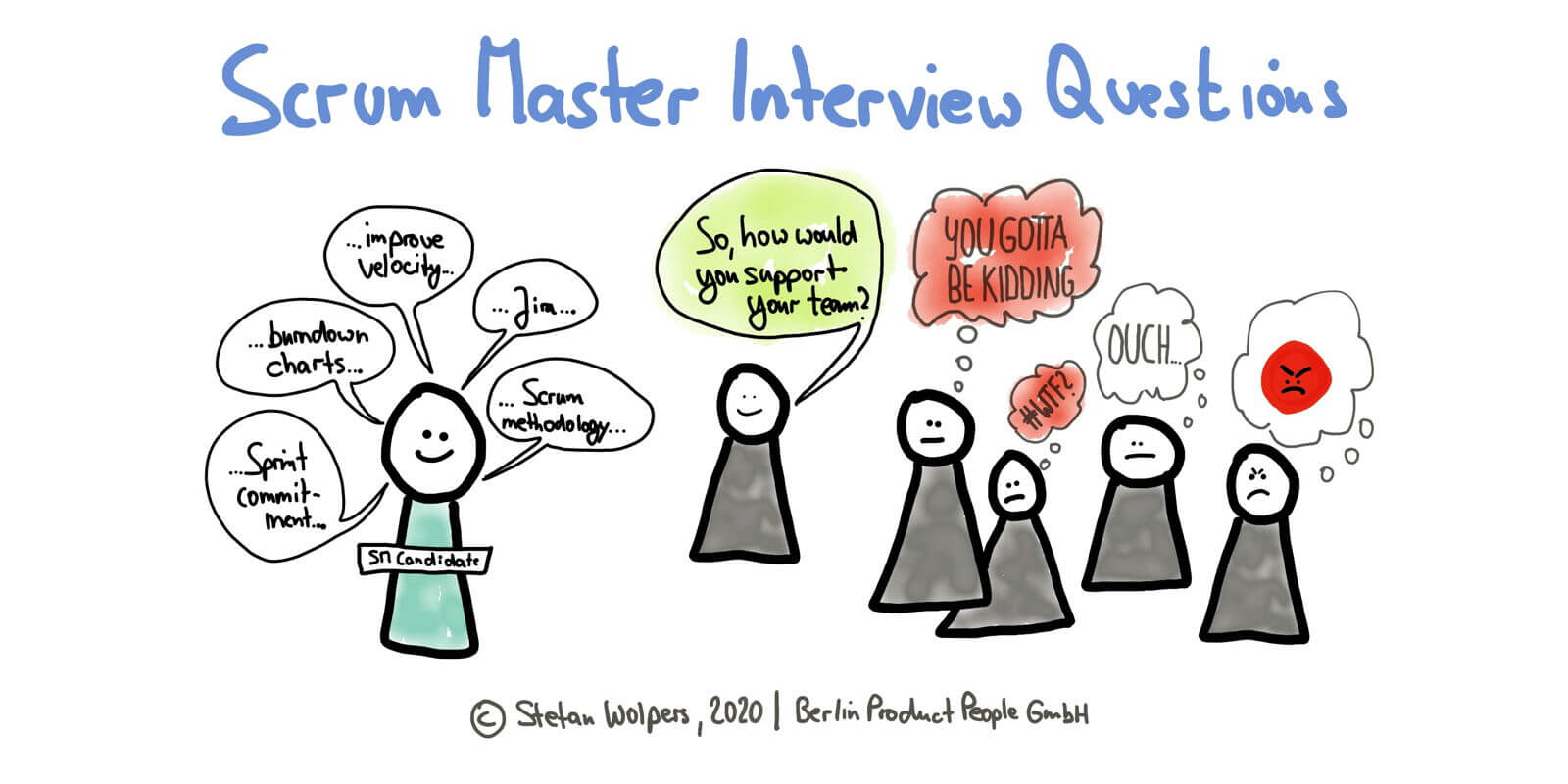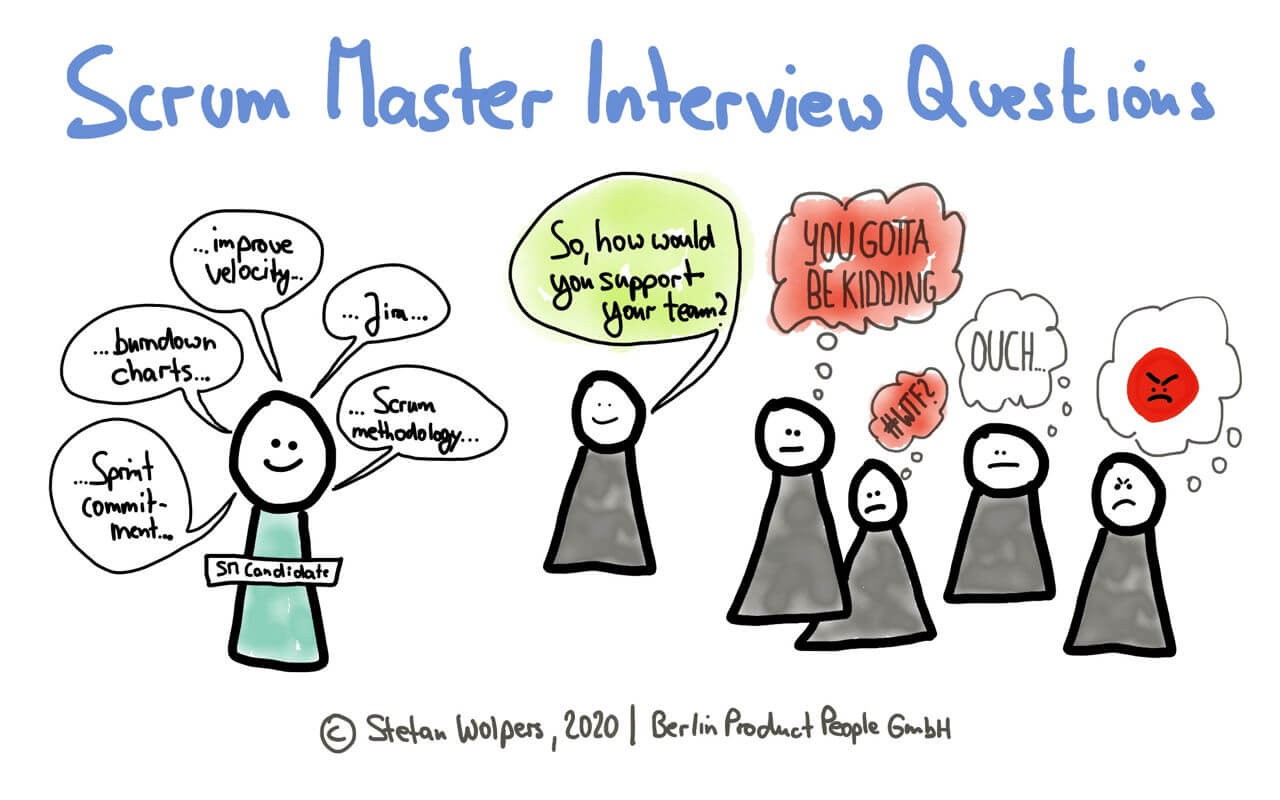Scrum has proven time and again to be the most popular framework for software development. Given that software is eating the world, a seasoned Scrum Master is nowadays in high demand. And that demand causes the market-entry of new professionals from other project management branches, probably believing that reading one or two Scrum books will be sufficient. Which makes a suitable set of Scrum Master interview question more necessary than ever to help you identify suitable candidates
If you are looking to fill a position for a Scrum Master (or agile coach) in your organization, you may find the following Scrum Master interview questions useful to identify the right candidate. They are derived from my fourteen years of practical experience with XP as well as Scrum, serving both as Product Owner and Scrum Master as well as interviewing dozens of Scrum Master candidates on behalf of my clients.

Introduction
Maybe ‘Agile’ in general is a fad as opposed to a trend. Though whatever the case, we can say for sure that Scrum is very popular in software development. Demand for seasoned Scrum practitioners and the entry of new professionals into the market are both on the rise.
If you are looking to hire a Scrum Master for your organization, you will find the following interview questions useful in identifying the right candidate. Being cognizant of what to listen for in a candidate’s answers to these questions will allow you, as an interviewer, to more quickly understand not only a candidate’s familiarity with Scrum — but also their agile mindset. Given the complexity of applying agile practices to any organization, multiple-choice questions are mostly insufficient when you need to discern a candidate’s agile mindset.
Topics of the Scrum Master Interview Questions Guide
The interview guide comprises eight topics, from the role and artifacts to collaboration with the Product Owner to Scrum anti-patterns. This article will cover the largest category of them — the role of the Scrum Master:
The Background on the Role of the Scrum Master
- Scrum is not a methodology, but a framework. There are no rules that apply to every scenario — just good practices that have worked before in other organizations.
- The good practices of other organizations cannot simply be copied to your own. Every good practice requires a particular context to work.
- As somebody hiring for a Scrum Team, you need to determine for yourself what works for your organization — which is a process, not a destination.
- The role of a Scrum Master is primarily one of servant leadership and coaching. It is not a mere management role. (Although the Scrum Master role also has management aspects, for example, regarding the responsibility for promoting and supporting Scrum within the organization.)
- A Scrum Master should recognize that different stages of a Scrum Team’s development require different approaches: some, teaching; some, coaching; and some, mentoring.
- A Scrum Master should know of the Shu-Ha-Ri (Japanese martial arts) method of learning new techniques.
- A Scrum Master’s principal objective should be to remove themselves from daily operations by enabling the Scrum Team to be self-organizing.
- Being a Scrum Master does not entail, and should never entail, enforcing processes.
- Scrum is not designed for bean counters, although some metrics help understand the health of a Scrum Team. Generally, insisting that the team achieve specific KPI (e.g. forecasts vs. velocity) does not help.
- Scrum doesn’t elaborate on the process that enables a Product Owner to add valuable, usable, and feasible work items such as features to the Product Backlog. Product discovery using the Design Thinking, Lean Startup, or Lean UX frameworks help, but in any case, a good Scrum Master will want the Scrum Team to be a part of this process (whether by participating in user interviews or running experiments).
- A Scrum Team’s communication with stakeholders should not be run through a gatekeeper (e.g. solely through the Product Owner) because this hurts transparency and negatively affects the team’s performance. Sprint Reviews, conversely, are a good way to stay in close contact with stakeholders and to present the value delivered by the Scrum Team during each previous Sprint.
The Interview Questions Regarding the Role of the Scrum Master
Question 01: The Scrum Master Role as a Contradiction?
The Agile Manifesto infers people over processes. Isn’t a Scrum Master — whose role is meant to “enforce” the process — therefore a contradiction?
Scrum Masters do not wield any real authority but act as servant leaders. The Scrum Team does not report to them. This question is meant to help reveal whether your candidate understands that their role is to lead — as opposed to managing — the team. Asking this question is also likely to reveal why your candidate is interested in the role of a Scrum Master in the first place.
Acceptable answers should emphasize facilitation and support, for example:
- “I am the servant-leader for the Scrum Team. It’s my job to make them successful.”
- “I am neither a project manager nor a people manager. I support the Scrum Team in achieving self-organization. I do not tell people what to do.”
- “I am the Scrum Team’s facilitator as teacher, coach, or mentor, encouraging them to excel as a team.”
Question 02: Success Factors of “Agile”
What indicators might there be that demonstrate agile practices are working for your organization, and which of these would demonstrate your efforts are succeeding?
There is no standard or general definition of ‘agile success’ that can be used to measure an organization’s agility. Every organization must develop its own criteria. Increasing team velocity is usually not considered to be a meaningful indicator.
However, although mostly indirect, various indicators may be useful in determining success:
- Products delivered to customers are resulting in higher retention rates, better conversion rates, increased customer lifetime value, and similar improvements to the business. (A successful Scrum Team provides a good return on investment to the business.)
- The improved organizational agility allows pursuing market opportunities successfully, which previously would have been considered futile.
- There has been a reduced allocation of resources to low-value products.
- Lead time, from validated idea to shipped product, has been reduced.
- The cycle time for hypotheses validations has been reduced, speeding up the product discovery process.
- Improved team happiness is exhibited by reduced churn and an increase in the number of referrals from team members.
- Increased competitiveness in the war for talent can be demonstrated by an increase in the number of experienced people willing to join the organization.
- Increased software quality can be demonstrated by measurably less technical debt, fewer bugs, and less time spent on maintenance.
- There is greater respect among stakeholders for the product delivery teams.
- Stakeholders are increasingly participating in events, for example, during the Sprint Review.
#scrum master #hiring #job interview #interview answers #agile coach #agile coaches #scrummaster #hiring and recruiting
